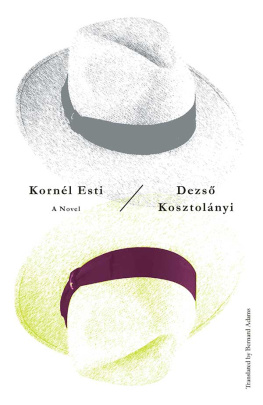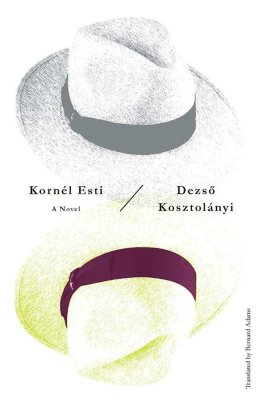Deszo Kosztolanyi - Kornel Esti
Here you can read online Deszo Kosztolanyi - Kornel Esti full text of the book (entire story) in english for free. Download pdf and epub, get meaning, cover and reviews about this ebook. year: 2011, publisher: New Directions Publishing, genre: Art. Description of the work, (preface) as well as reviews are available. Best literature library LitArk.com created for fans of good reading and offers a wide selection of genres:
Romance novel
Science fiction
Adventure
Detective
Science
History
Home and family
Prose
Art
Politics
Computer
Non-fiction
Religion
Business
Children
Humor
Choose a favorite category and find really read worthwhile books. Enjoy immersion in the world of imagination, feel the emotions of the characters or learn something new for yourself, make an fascinating discovery.
- Book:Kornel Esti
- Author:
- Publisher:New Directions Publishing
- Genre:
- Year:2011
- Rating:5 / 5
- Favourites:Add to favourites
- Your mark:
- 100
- 1
- 2
- 3
- 4
- 5
Kornel Esti: summary, description and annotation
We offer to read an annotation, description, summary or preface (depends on what the author of the book "Kornel Esti" wrote himself). If you haven't found the necessary information about the book — write in the comments, we will try to find it.
Kornel Esti — read online for free the complete book (whole text) full work
Below is the text of the book, divided by pages. System saving the place of the last page read, allows you to conveniently read the book "Kornel Esti" online for free, without having to search again every time where you left off. Put a bookmark, and you can go to the page where you finished reading at any time.
Font size:
Interval:
Bookmark:

Also by Dezs Kosztolnyi
from New Directions
Anna Edes
Kornl Esti
Dezs Kosztolnyi
Kosztolnyi
Translated by Bernard Adams
A NEW DIRECTIONS BOOK
Copyright 1933 by Dezs Kosztolnyi
Translation copyright 2011 by Bernard Adams
All rights reserved. Except for brief passages quoted in a newspaper, magazine, radio, television, or website review, no part of this book may be reproduced in any form or by any means, electronic or mechanical, including photocopying and recording, or by any information storage and retrieval system, without permission in writing from the Publisher.
Grateful acknowledgment to the Hungarian Book
Foundation, which supported the translation of this book.

Manufactured in the United States of America
Published simultaneously in Canada by Penguin Books Canada, Ltd.
New Directions Books are printed on acid-free paper.
First published as a New Directions Paperbook Original (NDP1194) in 2011
Library of Congress Cataloging-in-Publication Data
Kosztolnyi, Dezso, 18851936.
[Esti Kornl. English]
Kornl Esti / Dezso Kosztolnyi ; translated by Bernard Adams.
p. cm.
eISBN 978-0-8112-1958-7
1. Self-perception--Fiction. 2. Doppelgngers--Fiction.
3. Authorship--Fiction. 4. Psychological fiction.
I. Adams, Bernard. II. Title.
PH3281.K85E6713 2011
894'.51133--dc22 2010048874
10 9 8 7 6 5 4 3 2 1
New Directions Books are published for James Laughlin
by New Directions Publishing Corporation,
80 Eighth Avenue, New York 10011
In which the writer introduces and unveils Kornl Esti, the sole hero of this book
I HAD PASSED THE MIDPOINT OF MY LIFE, WHEN ONE WINDY day in spring, I remembered Kornl Esti. I decided to call on him and to revive our former friendship.
By then wed had no contact for ten years. What had come between us? I dont know. We hadnt fallen out. At least, not like other people do.
Once Id passed the age of thirty, however, he began to irritate me. His frivolity was offensive. I became tired of his old-fashioned wing collars, his narrow yellow ties, and especially his atrocious puns. His determined eccentricity wore me out. He was forever getting mixed up in escapades of one sort or another.
For instance, one day as we were walking along the esplanade together, he, without a word of explanation, took from the inside pocket of his coat a kitchen knife, and to the amazement of the passers by started to sharpen it on the stones that lined the path. Or, another time, he most politely accosted a poor blind man to remove from his eye a speck of dust that had just gone into it. On one occasion, when I was expecting some very distinguished guests for dinner, men on whom my fate and career depended, editors-in-chief, politiciansgentlemen of rank and distinctionand Esti was also a guest in my home, he craftily made my servants heat the bathroom, took my guests aside one by one as they arrived, and informed them that there was in my house an ancient, mysterious, family tradition or superstitionunfortunately, no details could be giventhat required all guests without exception to take a bath before dinner, and he carried off this ridiculous prank with such devilish tact, cunning, and honeyed words that the credulous victims, who favored us with their presence for the first and last time, without my knowledge all took baths, as did their wives, and then, without batting an eyelid at the awful practical joke, sat down to dinner as if nothing had happened.
That kind of practical joke had amused me in the past, but now, at the beginning of my adult life, it rather annoyed me. I was afraid that sort of thing might easily jeopardize my good name. I didnt say a word to him. NeverthelessI confesshe embarrassed me more than once.
He too may well have felt the same about me. In the depths of his heart he probably looked down on me for not according his ideas the respect that they deservedperhaps he even despised me. He took me for a philistine because I used to buy an engagement diary, wrote in it every day, and did all the right things. On one occasion he accused me of forgetting what it was like to be young. And there may have been some truth in that. But thats the way life goes. Everyone forgets.
Slowly, imperceptibly, we drifted apart, but despite all that I understood him and he understood me. It was just that we kept passing judgment on one another secretly. The thought that we understood one another, yet didnt, set us both on edge. We went our separate ways. He went leftI went right.
For ten long years we had lived like that, without giving one another a sign of our existence. Naturally, however, Id thought of him. Scarcely a day went by when I didnt wonder what he would do or say in this or that situation. And I must suppose that he too thought of me. After all, our past was pervaded by so vigorous and pulsating a network of veins of memory that it couldnt have been so soon forgotten.
It would be difficult to give a full account of who and what he had been to me. I wouldnt even care to try. My memory doesnt go back as far as our friendship. Its beginnings are lost in the primeval mists of my infancy. He had been close to me ever since Id been aware of myself, always in front of me or behind, always with me or against me. Id worshipped Esti or loathed him, but Id never been indifferent to him.
One winter evening, after supper, I was building a tower of colored building bricks. Mother wanted me put to bed. She sent Nanny for me, because at that time I was still in skirts, and I started to go with her. Then a voice came from behind me, his unforgettable voice:
Dont go.
I turned round and, in delight and alarm, looked at him. It was the first time that Id seen him. He gave me an encouraging grin. I took his arm for him to help me, but Nanny pulled me away and, rage though I might, put me to bed.
From then on we met every day.
In the morning he would spring forward by the washstand.
Dont wash up, stay dirty, hooray for dirt!
If at lunch, despite my convictions to the contrary, I began at my parents repeated request to spoon up the nourishing and wholesome lentil soup, he would whisper in my ear:
Spit it out, throw up onto your plate, wait for the roast or the dessert.
Sometimes he was at home with me, at table or in bed, but he went into the street with me as well.
Once Uncle Loizi was coming toward us, an old friend of my fathers, whom I had always liked and respected, a three-hundred-pound magistrate. Kornl shouted at me:
Stick your tongue out. And he stuck out his own till it reached the point of his chin.
He was a cheeky boy, but interesting, never dull.
He put a lighted candle in my hand.
Set fire to the curtains! he urged me. Set fire to the house. Set the world on fire.
He put a knife in my hand too.
Stick it in your heart! he exclaimed. Bloods red. Bloods warm. Bloods pretty.
I didnt dare follow his suggestions, but I was pleased that he dared to put into words what I thought. I said nothing, gave a chilly smile. I was afraid of him and attracted to him.
After a summer shower I found a sparrow chick, drenched, under the broom bush. As I had been taught in Scripture lessons, I put it on my palm, and performing an act of bodily and spiritual kindness, took it into the kitchen to dry it by the fire. I sprinkled crumbs in front of it. Tucked it up in some rags. Sat it on my arm and stroked it.
Font size:
Interval:
Bookmark:
Similar books «Kornel Esti»
Look at similar books to Kornel Esti. We have selected literature similar in name and meaning in the hope of providing readers with more options to find new, interesting, not yet read works.
Discussion, reviews of the book Kornel Esti and just readers' own opinions. Leave your comments, write what you think about the work, its meaning or the main characters. Specify what exactly you liked and what you didn't like, and why you think so.









